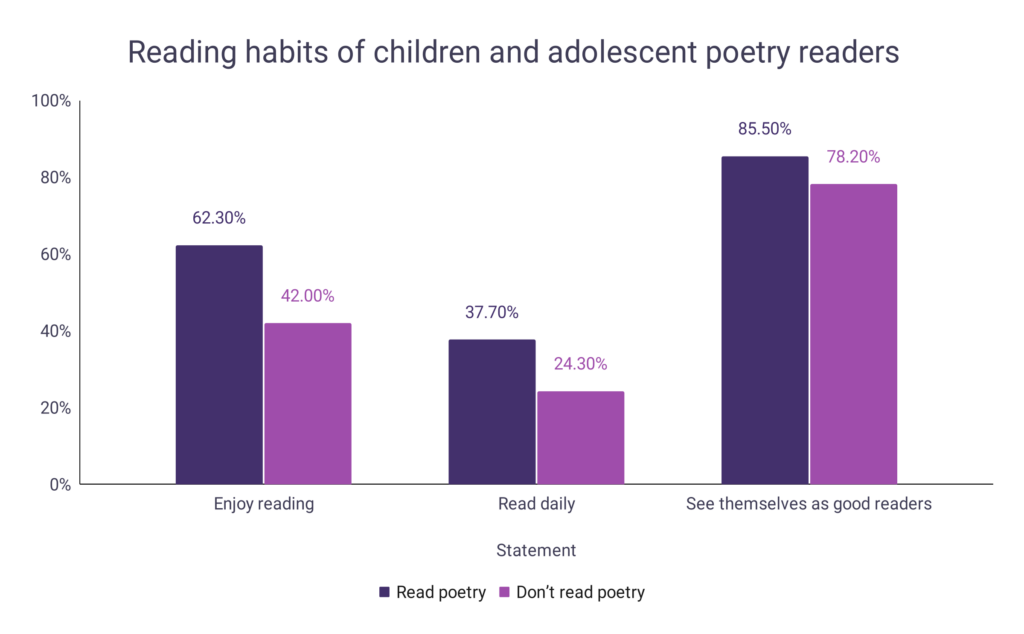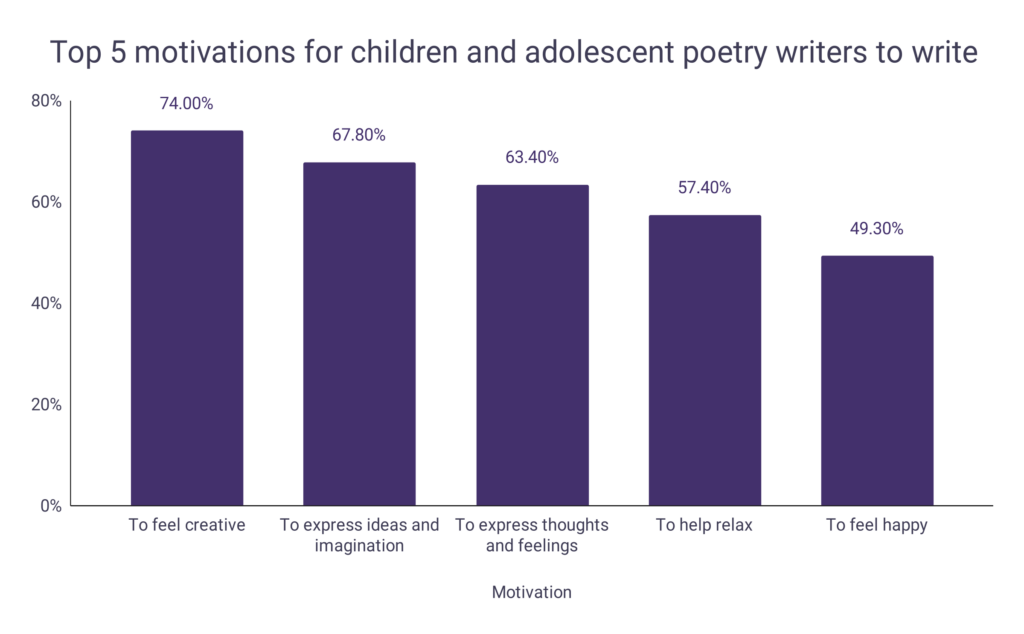Poetry is popular around the world for its importance to the expression of thoughts and feelings, allowing authors and readers to momentarily escape reality and understand the world in new ways. In addition to providing a foundation to showcase creativity, poetry is also associated with many positive behaviors and abilities.
- As of 2023, 80% of UK teachers think poetry forms a significant part within the literacy curriculum.
- 89% reported that children enjoyed listening to poetry being either read or performed.
- Despite this, 69% felt as though there were barriers in the classroom when it comes to teaching poetry.
- When poetry is read aloud by students, it can help them develop the confidence and enthusiasm to begin reading other genres.
- For this reason, poems are particularly useful when trying to motivate a non-reader to develop a regular reading habit.
- 50.9% of children and adolescents that read poetry also write poetry (both during free time).
- Research has shown that even without any training or experience, the brain is able to recognize the poetic harmony present in poetry, which is part of its appeal.
- The use of rhyming within poems is also great for developing phonetic awareness in a reader or listener.
- During periods of stress, grief or trauma, poetry can boost the mood and provide a sense of comfort in individuals.
- Poetry can activate brain areas associated with introspection and enable the reader or listener to be more open-minded to different perspectives.
Reading habits of children and adolescent poetry readers
- In a survey of 8-18 year olds, 62.30% of poetry readers enjoyed reading, compared to 42.00% of those who didn’t read poetry.
- 37.70% of poetry readers read daily, compared to 24.30% of those who didn’t read poetry.
- 85.50% of poetry readers saw themselves as good readers, compared to 78.20% of those who didn’t read poetry.
| Statement | Read poetry | Don’t read poetry |
| Enjoy reading | 62.30% | 42.00% |
| Read daily | 37.70% | 24.30% |
| See themselves as good readers | 85.50% | 78.20% |
A graph is given below to show reading habits of children and adolescent poetry readers:

Motivation for reading in children and adolescent poetry readers
- In a survey of 8-18 year olds, poetry readers were found to read for curiosity, mindfulness, social and functional reasons.
- 67.60% of poetry readers were motivated to read to learn new words.
- 65.80% of poetry readers were motivated to read to learn about new things.
- 64.50% of poetry readers were motivated to read to help them relax.
| Reading motivation | Category | Percentage |
| To learn new words | Functional | 67.60% |
| To learn about new things | Functional | 65.80% |
| To help relax | Mindful | 64.50% |
| To feel happy | Mindful | 53.00% |
| To learn about other people and cultures | Curious | 51.80% |
| To understand the views of others | Curious | 51.50% |
| To feel more confident | Mindful | 40.60% |
| To learn more about issues/causes cared about | Social | 40.50% |
| To feel better when sad | Mindful | 40.00% |
| To feel connected to the world | Social | 36.10% |
| To help deal with problems | Mindful | 34.10% |
| To spend time with others | Social | 18.40% |
A graph is given below to show the top 5 motivations for children and adolescent poetry readers to read:

Writing habits of children and adolescent poetry writers
- In a survey of 8-18 year olds, 59.10% of poetry writers enjoyed writing, compared to 29.10% of those who didn’t read poetry.
- 27.90% of poetry writers wrote daily, compared to 15.60% of those who didn’t write poetry.
- 80.40% of poetry writers saw themselves as good writers, compared to 66.70% of those who didn’t write poetry.
| Statement | Write poetry | Don’t write poetry |
| Enjoy writing | 59.10% | 29.10% |
| Write daily | 27.90% | 15.60% |
| See themselves as good writers | 80.40% | 66.70% |
A graph is given below to show writing habits of children and adolescent poetry writers:

Motivation to write for children and adolescent poetry writers
- In a survey of 8-18 year olds, poetry writers were found to write for creativity, mindfulness and social reasons.
- 74.00% of poetry writers were motivated to write to feel creative.
- 67.80% of poetry writers were motivated to write to express ideas and imagination.
- 63.40% of poetry writers were motivated to write to express thoughts and feelings.
| Writing motivation | Category | Percentage |
| To feel creative | Creative | 74.00% |
| To express ideas and imagination | Creative | 67.80% |
| To express thoughts and feelings | Creative | 63.40% |
| To help relax | Mindful | 57.40% |
| To feel happy | Mindful | 49.30% |
| To feel more confident | Mindful | 48.10% |
| To feel better when sad | Mindful | 37.80% |
| To deal with problems | Mindful | 36.00% |
| To feel connected to the world | Social | 35.70% |
| To support issues/causes cared about | Social | 31.10% |
A graph is given below to show the top 5 motivations for children and adolescent poetry writers to write:

Effects of poetry on health
Poems have a unique ability to positively impact health and well-being in readers, listeners and writers alike. Poetry is often seen as therapeutic, which calms the mind and provides a range of healing benefits.
- Due to poetry’s rhythmic and repetitive nature, it can have a relaxing effect on the body, lowering blood pressure and the heart rate.
- A study found that providing opportunities for hospitalized children to read and write poetry allowed them to reduce a multitude of negative emotions.
- Cancer patients that undertook poetry therapy have been found to increase their emotional resilience, reduce their anxiety and improve their quality of life.
- People who have suffered from strokes were able to improve their cognitive function by reading poetry, improving their ability to handle stress.
- Poetry can help those suffering from serious illness find meaning, solace and enjoyment in the most difficult times.
- Poetry has even been found to help raise the empathy of healthcare workers towards their patients.
Effects of poetry on the brain
The influence of poetry on the human brain is a topic of interest for both researchers and fans of the unique literature form. Poetry has a profound influence on its readers, with fascinating effects on cognitive processes and emotional responses.
- The human brain is able to automatically detect harmonies and patterns in poetry.
- This phenomenon is even applicable in people whose previous exposure to poetry is minimal.
- A possible reason why humans tend to enjoy poetry is that the rhymes and repeated patterns present are easier for us to comprehend.
- Poetry stanzas which contain rhythm and rhyme have been shown to draw a greater appreciation from the reader/listener which in turn leads to more positive emotions.
- Participants who were read poetry were able to feel intense emotions and chills, even in those who rarely listened to poetry before.
- The right word at the right time in a poem is able to intensify the level of positive emotions in the reader.
What is poetry therapy?
Poetry therapy allows individuals to better understand and manage their emotions through the process of reading and writing poetry. It is frequently combined with other forms of therapy to help patients approach their issues using a different method.
- Poetry therapy can help people with complex neurological issues, such as schizophrenia sufferers, process their difficulties.
- It can offer people a way of expressing or understanding emotions through metaphor.
- By reading another author’s poetry, a person may be more likely to open up, helping them to feel understood and supported.
- Specific poetry topics can be tailored to the patient, allowing them to understand or express the feelings that come with a type of situation.
- For example, a patient who is suffering from depression can read poems related to depression, helping them feel a sense of identification with the author.
- Patients can also contribute by writing their own poetry, helping them to articulate their thoughts which could even be read by others in the future.

